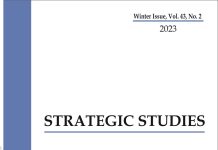The author, Madiha Afzal, a US-based scholar, explains the structural roots of extremism in Pakistan by focusing on the dimensions law, education and Islamism. The methodology chosen is a series of public opinion surveys carried out in Pakistan over the past decade and a half. This data is combined with historical analysis and the author’s own research. The merit of the book is that it relates largely abstract themes to concrete issues concerning the Afghan Taliban, the Tehrik-i-Taliban Pakistan (TTP), the Lashkar-e-Taiba/ Jamaat-ud-Dawa, attitudes to India and the Kashmir issue, Afghanistan, the US etc. The central question of the book is ‘Are ordinary Pakistanis extremists?’ According to the author’s findings, the situation of extremism in Pakistan is very complex in nature as overwhelming number of Pakistanis are opposed to the terrorism but their nationalistic ideology tend to show extreme narratives due to the anti-Indian sentiment, hate against the US and its policies towards Pakistan, status of Islam in the West and, possibly most of all, by a sense of ‘national victimhood.’ The findings help observe the nuances of extremism in the fabric of Pakistani society. To this end, the role of the Pakistani state itself and its ‘reliance on Islam to define Pakistan’s identity’ and its policies towards India create an environment which nurtures the extremist views in the society. Therefore, a mindset of denial that terrorist attacks in Pakistan are the result of external conspiracy can be addressed as a root cause of the entire problem in society.
Home ISSI Publications ISSI Publications Articles Pakistan Under Siege, Afzal, Madiha. Penguin India Press: 2018, 192.












